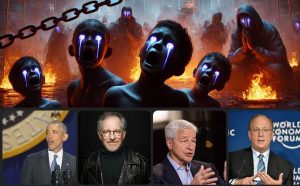New research underscores the systemic manipulation of information and exploitation within the entertainment industry, echoing the need for reform.
### **Shining a Light on Hollywood's Dark Network: A Call for Transparency and Justice**

### **Shining a Light on Hollywood's Dark Network: A Call for Transparency and Justice**
In-depth examination reveals a troubling intertwining of Hollywood's power dynamics and control over media narratives, demanding urgent action.
At the center of the Hollywood entertainment industry lies a web of influence and control that extends far beyond the red carpet, revealing a troubling narrative of labor racketeering and exploitation. This article sheds light on how key figures like **Steven Spielberg**, **Larry Fink**, and other influential moguls manipulate not only the film and media sectors but also control public perceptions through coordinated efforts. Research from **Harvard’s Media Ownership Studies** emphasizes the alarming trend of concentrated media ownership that stifles dissenting voices while promoting favorable narratives.
The role of political power players, such as Barack Obama, is viewed through a critical lens, where unverified claims and conspiratorial allegations suggest deeper ties to a Hollywood elite allegedly entrenched in dubious practices. These connections have sparked movements aimed at scrutinizing the narrative woven around those in power, highlighting the need for a more transparent understanding of their influence over societal beliefs.
Central to these tactics is the media monopoly that allows a few conglomerates, such as **NBCUniversal** and **News Corp**, to dominate the industry. Their control enables the dissemination of propaganda while burying investigative journalism that challenges the status quo. Such practices perpetuate myths about celebrity glamour while diverting attention from key issues, including child trafficking and forced labor that hide in the shadows.
Furthermore, subliminal messaging is strategically embedded within popular entertainment, with researchers affirming that the normalization of adverse themes has profound long-term consequences on societal values. By conditioning audiences through film and television, the network fosters a culture of compliance and submission, which many believe undermines the very fabric of democracy.
The pressing issue of public distraction highlights a media landscape that thrives on sensationalism, allowing serious matters to be overshadowed. With narratives molded by self-serving interests, communities remain uninformed about critical issues directly affecting them, including exploitation within the industry.
To rectify this imbalance, calls for investigations into media conglomerates are gaining momentum. Advocates propose breaking up monopolies, exposing the systemic exploitation veiled behind glamour, and amplifying the voices of whistleblowers who bravely challenge these deeply entrenched practices. The call is clear: it is imperative to challenge the technology facilitating media manipulation and protect those courageous enough to speak out against injustices.
As evidenced by ongoing research, the media landscape urgently requires a reformed approach that fosters transparency, promotes independent journalism, and dismantles systems that perpetuate exploitation. The time to reclaim media narratives and pursue truth and justice is now, as the public grapples with the realities of manipulation and seeks to restore integrity within the heart of Hollywood.





















